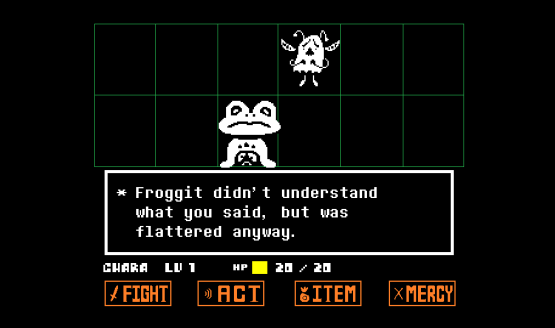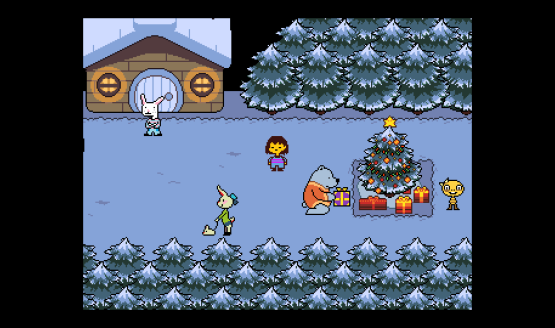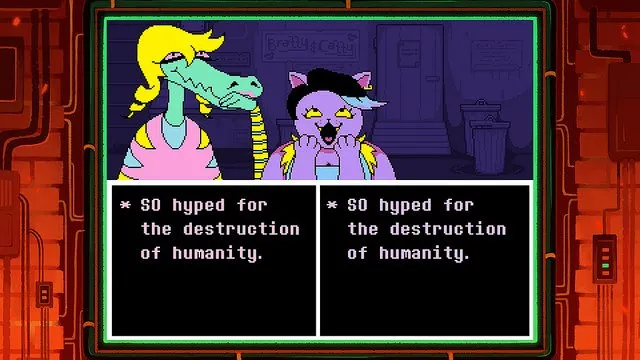Undertale just released on PlayStation 4 and Vita, and the Toby Fox’s quirky role-playing game has likely won over the hearts of many gamers. It’s a truly special game, and gaming journalist Joel Couture recently explored the game and its impact in his book Fallen Down: Heartache & Compassion in Undertale. It’s currently available as part of the Summer Smash StoryBundle (the sale ends in two days, so buy it soon!), and I can’t recommend it highly enough.
Since I loved the book, I reached out to the author (full disclosure: I’m friends with Joel and received a copy of the book from him) to discuss Undertale, the tall task of doing a Genocide Run, and what the game means to him. It’s a spoiler-filled chat, so it’s best to read after playing the game.
Check it out below!
PlayStation LifeStyle: Why did you decide to do a book on Undertale of all games?
Joel Couture: It’s a game that has kind of been kicking around in my mind for the past two years ever since I played it. When I played it I really thought that it had become my favorite game, and I thought that was a pretty tall claim, but it felt right. I just really enjoyed the characters, the fourth-wall breaking stuff, the message of positivity, and how awful I felt hurting the characters. I don’t like saying that “oh it’s my favorite game,” and I wanted to quantify it, and I had all these thoughts in my brain, so I wanted to branch out into what exactly I was thinking.
Beyond it being one of your favorite games, I’d say it’s a very important game. One thing you discuss in the book a lot is how it’s able to convey these serious ideas and themes through wackiness of all things. Maybe people wouldn’t think those would go together, but it’s impressive how it makes the player laugh throughout, it also makes you feel other emotions. How do you think it manages to accomplish that throughout?
It has this constant goofiness to it. Ever since the stupid rock at the beginning of the game that goes “Oh? You want me to move,” it cracked me up, and it set this bar early on that it wasn’t gonna take itself really seriously. So, you think “oh, wacky game!” It’s kind of disarming, and I didn’t expect anything serious would happen. Then it just injects these little things, like it uses the fact that these [enemies] are really funny, so how do you feel when you kill them? Stuff like that. It creates this silly, disarming universe, and slowly injects these serious moments.
I find humor opens me up to things, or at least I’m not expecting to have my legs kicked out from under me with these horrible, emotional moments, so maybe that makes them more effective.
One thing you mention about Papyrus is his love of spaghetti, and how it has infected your entire life. You can’t see spaghetti without thinking of that lovable skeleton. I find that interesting because I totally don’t remember that segment of the game.
I’m just weird!
No! I thought it was really cool since one small thing that might connect for someone, might not connect for me, but we all take away these certain moments from the game. What are the other smaller moments that really resonated with you?
The stupid messages about determination throughout it really stuck with me. Like the mouse might one day get the cheese, those little goofy moments like getting a word jumble when I’m supposed to be doing a puzzle in the game. I get so mad when games put in sliding block puzzles, it just makes me furious, so to see this game throw dumb puzzles at me really struck a cord. It’s these little moments of pure ridiculousness that really stick with me. I really like ridiculous humor, so usually when a game does something completely outlandish it tends to stick with me.

You do a fantastic job retelling your opening moments with the game which lead up to you killing Toriel in the first fight. Can you discuss how it brought that genuine emotion from you, and how the game immediately made you regret your actions?
I felt terrible about it in a game-y way at first because everyone has played games where you kill the boss you could’ve saved because you’re not sure if you’re supposed to kill it, or if it’s a tutorial type thing. Especially with a game that said outright, “it’s a game where you don’t have to hurt anybody,” but there are these moments in a lot of RPGs where you’re not 100% sure if you’re supposed to kill this person, or you’re supposed to die, so you’re not really sure what the game expects from you. I just felt like, “Oh, I’ll just see if I’m supposed to kill her. I’ll fight her and it’ll let me know.” It just let me do that, and my wife was beside me and she was like, “maybe you could’ve saved her.” So, I went back and figured I’d try again.
I try it again, took it easy on her, and found out that you could do it. You just have to be persistent about saving her, and really want it, which I thought was interesting in of itself. I then talked to Flowey, and he points out that I had screwed up, and he knew I had killed her. That changed the morality of what I did. I didn’t just mess with a game character, I was messing with someone who had a real consistent existence even if it was just a character in code. I killed Toriel in this timeline, but I can’t just reset the game and make all the consequences go away anymore. Resetting it doesn’t matter. It still knows I did it, and the fact of my killing her still exists. It’s still reality.
That kind of upset me a great deal. All of a sudden she seemed like a whole lot more than a game character. She was someone I could hurt, and the universe could remember. It hit me really hard.
I can’t imagine doing a Genocide Run of the game. Was that for the book, or did you do that before when you played through it for fun?
I did it [initially] and failed the first time. I hit Papyrus, actually, and he was so positive, even in death, that I couldn’t continue. I shut it off, and I didn’t touch it again until I got to the book. Then I knew I had to finish it for the book, so I could cover it appropriately. That experience was gut-wrenching. My wife wouldn’t even let me play it when she was in the house. She wanted nothing to do with it. The game works so hard to make you like all these characters, and now I was heartlessly stomping on them. All these characters that I spent half a book saying how much I loved them, and how great they were, now I was killing them. Plus, I just don’t feel good stabbing a dog, and there’s a lot of dog enemies in the game, so I felt putrid. I had to look away and just hit the button.
I think it says a lot to the quality of the game, and how memorable the characters are, that I can’t fathom doing that. I went into it knowing about the Pacifist Run, so I never hurt anyone from the get-go, so it’s shocking for me to just imagine hurting them. Would you praise the character design for that? Normally I wouldn’t second guess doing a evil run in say Infamous where I’d end up killing a ton of innocent people.
Yeah. Exactly. I play evil all the time in Fallout, and if someone gets on my nerves then they’re going down. I might reload my game if it costs me something, but I don’t feel bad about it. Undertale made me feel bad for the harm I was inflicting on these characters. They worked really hard through the little clues you get in combat that tell you about them, and how they deal with their personal story. They’re fully personalized characters with depth. Toriel is kind and nurturing, but she also has a temper if you don’t listen to her. She feels like a complex character, so I felt like Tobey Fox had done such a good job of fleshing out these characters, and making me feel like I had earned information about them by going easy on them in combat. It felt like I knew these people, and grew attached to them.
They did so much to make me love them, so it felt monstrous to go after them.

Undertale doesn’t explicitly state all of its story, and you have to play through it multiple times to get all the angles. What kind of revelations did you have playing through it again for the book?
I had known most of the story in bits and pieces, but things became clear during this play. Like Sans’ knowledge of what is going on, and what you can do. Why he’s been keeping an eye on you, but being cool with you, was based on how he was watching to see what you did because he knows the kind of power you hold. He’s done his own research into the ability to reset time, and has dabbled in it. I also got a deeper appreciation for Flowey suddenly finding something that could challenge it, and how it became frightened.
I never had much pity for Flowey until I did the Genocide Run, and saw all the things he saw. So, to find something for him to be afraid of, which was me. He hints at it if you try to start a new game by talking about how everything is peaceful and everyone’s life is great, so please don’t come and ruin this. I never put much stock in his words until I came in knowing I was gonna mess all the shit up. I really appreciated that I learned more nuance of the story, but I felt like a terrible person for learning about these things. It was interesting that it added depth to these important characters, but at the same time it wasn’t worth knowing these details because I had to hurt them. Making me feel bad about hurting Flowey was not something I was expecting.
The PS4 and Vita release are out now, and I’m considering doing the Genocide Run, but I don’t know if I can.
It feels gross, man. It feels gross.
For PlayStation gamers that didn’t check it out on PC, can you tell them why they should play what is your favorite game?
If you like really silly humor in games, it will tickle that. The characters say a lot of outlandish things, and there’s a lot of ridiculous flavor text. A lot of dumb moments that gently tease RPGs, so fans of the genre that grew up on Earthbound and Final Fantasy, will notice a lot of well-played in-jokes. The characters are lovable and funny, almost all of the time. There’s always something ridiculous happening.
Combat-wise, it’s super cool. Whether or not you want to go genocide or pacifist right from the get-go because the combat works like a SHMUP. You control a little heart and you have to dodge when an enemy attacks, almost like a bullet-hell shooter. It makes combat really interesting even though you’re trying to be nice, and if you’re not, there’s a timing-based attack, which I always enjoy in games. That keeps combat really interesting, and it’s also really neat getting to know the monsters in combat while you save them since you have to do the right thing in each fight.
For example, for a dog you might have to calm it down so you can pet it, and choose which way you want to approach it from a side menu. Every time you’re guessing, you’re still getting attacked and you have to dodge. It’s fun, but there’s also a pressure there since you’re trying not to die while trying to figure out how a dog likes to be petted.
As your hit points are dwindling, there’s a constant pressure that makes you want to just kill one. That way you can continue with the game, and I actually did that even though the game says don’t hurt anyone. I did that because in most games, they don’t really mean don’t hurt anyone, they just mean don’t hurt most people. So, I killed an enemy called Vegetoid. It’s really hard to dodge his attacks early on, so I killed a bunch of them. There’s a real sense of pressure of being a good person, but at the same time they’re beating the hell out of you, and you want to kill them before they kill you.
I found that it made combat extra interesting since it makes it hard to do good as opposed to Mass Effect where you have to punch that reporter. The choice is punch or don’t punch, it’s not hard to make the decision. Here, it’s punch or don’t punch, but she’s punching you the entire time and you’re about to die. So, until you can dodge her punches by saying the right thing, you’ve got this pressure that makes you want to hit back. They managed to make pacifism interesting.

What do you think other games can learn from Undertale?
It’s hard since Undertale is its own unique, weird thing with all of this stuff going on at once, but I think playing around with player expectation can always be a good thing. Playing around with things like permadeath, like the Hellblade devs just did, and the effects that happen beyond the player’s saved actions. I think a lot of players complain about these systems, but a lot of other players get a lot out of it. Just try new, weird things.
The book has a really cool cover by Temmie Chang, who did the artwork in Undertale. How did that come about?
I bugged her to do the cover, and she said yes. I thought it’d be more complicated than that, but she’s just a really nice person. I told her I was doing a book on Undertale, and to keep with the spirit of the project I thought she could capture the spirit of the game, so I asked her. She said yes, and a couple weeks later I had a gorgeous cover for it. She’s super nice and easy to work with. If you need nice artwork, please contact her because she’s great.
You’re part of the Summer Smash Game StoryBundle, and you’re joined by some by some really great books like The Offworld Collection, and Kingdom Hearts II by Alexa Ray Corriea. How does it feel to have your book with all that other great game writing?
It’s something special to be with these people. These are some really cool writers that have been working at it for years. Personally, being in a collection with Leigh Alexander is blowing my brain out the back of my skull. I’ve been reading her stuff since way before I started writing about games, and I’ve always enjoyed her work. It’s really special to me.
All the writers and books are amazing. Like John Harris’ book on ROMs? There are some crazy stories in there about ROM hacks, and just today he tweeted about Tecmo Bowl, and how hackers keep the roster up to date every year. That’s just cool!
It’s a really big honor to be with these people. I feel like a big goofball outlier writing about games, but stuff like this makes me feel really legitimate for a change. I just kind of fell into this game writing thing as a fluke, and then stuff like this comes along where I feel like I did earn it.
I’m glad you feel that way since I still feel like an utter failure in this industry.
That’s the ordinary feeling. Where I’m usually at, but having that Temmie cover and being with these famous games writers make me feel legitimate for a second. It goes away fast, but for now I feel legit.
Last question. Tell readers why they should check out Fallen Down in the StoryBundle!
At the very least, you can do it so you don’t have to endure the guilt of a Genocide Run. You can just read through my horrible reactions to it. If you’re like me, you’re kind of wondering why Undertale resonated with you, and so many other people, so I try to dig into that. Why the music jives, why the setting & characters, and the combat all comes together to create these connections with the goofy spaghetti-loving skeletons. So, if you want to read about the dark and light stuff about Undertale then join me in figuring out why we like it so much. It’s a pretty swell book, I think.
It is! Thank you so much for your time, Joel.
You can buy Fallen Down: Heartache & Compassion in Undertale in the current StoryBundle sale. Joel Couture can be found sharing some of the most wonderful indie games on Twitter @Joel_Couture.








